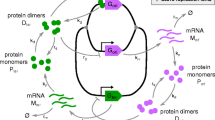Abstract
It has been proposed that transcription introduces a bias into the random process of mutation. Although this hypothesis is supported by experimental data for mutations arising during active bacterial growth, the role of transcription in mutagenesis in non-dividing bacteria is entirely hypothetical. In the present study, we tested the hypothesis of a possible role of transcription in a non-dividing E. coli K12 strain. In this strain (BD010), a mutated trpB allele ( trpB9578), placed under stringent transcriptional control, was tested for the appearance of prototrophic revertants on synthetic medium lacking tryptophan. The number of phenotypic revertants which appeared in the absence of trp transcription was compared to that observed when the mutated gene was continuously transcribed. Our results showed that transcription of trpB is not mutagenic under conditions of tryptophan starvation, and that the frequency of TrpB+ reversion is solely a function of the duration of starvation.


Similar content being viewed by others
References
Bridges BA (2001) Hypermutation in bacteria and other cellular systems. Philos Trans R Soc Lond Biol Sci 356:29–39
Bridges BA, Ereira S (1998) DNA synthesis and viability of a mutT derivative of Escherichia coli WP2 under conditions of amino acid starvation and relation to stationary-phase (adaptive) mutations. J Bacteriol 180:2906–2910
Bull HJ, Lombardo MJ, Rosenberg SM (2001) Stationary-phase mutation in the bacterial chromosome: recombination protein and DNA polymerase IV dependence. Proc Natl Acad Sci 98:8334–8341
Cairns J, Foster PL (1991) Adaptive reversion of a frameshift mutation in E. coli. Genetics 128:695–701
Cairns J, Overbaugh J, Miller S (1988) The origin of mutants. Nature 335:142–145
Datta A, Jinks-Robertson S (1995) Association of increased spontaneous mutation rates with high levels of transcription in yeast. Science 268:1616–1619
Davis BD (1989) Transcriptional bias: a non-lamarckian mechanism for substrate-induced mutations. Genetics 86:5005–5009
Drake JW (1991a) A constant rate of spontaneous mutation in DNA-based microbes. Proc Natl Acad Sci USA 88:7160–7164
Drake JW (1991b) Spontaneous mutations. Annu Rev Genet 25:125–146
Fix DF, Glickman BW (1987) Asymmetric cytosine deamination revealed by spontaneous mutational specificity in an Ung-strain of Escherichia coli. Mol Gen Genet 209:78–82
Foster PL (1993) Adaptive mutation: the uses of adversity. Annu Rev Microbiol 47:467–504
Foster PL (1994) Population dynamics of a Lac- strain of Escherichia coli: during selection for lactose utilization. Genetics 138:253–261
Foster PL (1999) Mechanism of stationary phase mutation: a decade of adaptive mutation. Annu Rev Genet 33:57–88
Foster PL, Rosche WA (1999) Mechanisms of mutation in nondividing cells. Insights from the study of adaptive mutation in Escherichia coli. Ann N Y Acad Sci 870:133–145
Francino MP, Chao L, Riley MA, Ochman H (1996) Asymmetries generated by transcription-coupled repair in enterobacterial genes. Science 272:107–109
Godoy VG, Fox MS (2000) Transposon stability and a role for conjugational transfer in adaptive mutability. Proc Natl Acad Sci 97:7393–7398
Hall BG (1990) Spontaneous point mutations that occur more often when advantageous than when neutral. Genetics 126:5–16
Hall BG (1991a) Adaptive evolution that requires multiple spontaneous mutations: mutations involving base substitutions. Proc Natl Acad Sci 88:5882–5886
Hall BG (1991b) Is the occurrence of some spontaneous mutations directed by environmental challenges? New Biologist 3:791–733
Harris RS, Longerich S, Rosenberg SM (1994) Recombination in adaptive mutation. Science 264:258–260
Janbon G, Sherman F, Rustchenko E (1999) Appearance and properties of L-sorbose-utilizing mutants of Candida albicans obtained on a selective plate. Genetics 153:653–64
Jayaraman R (1992) Cairnsian mutagenesis in Escherichia coli: genetic evidence for two pathways regulated by mutS and mutL genes. J Genet 71:23–41
Luria SE, Delbruck M (1943) Mutations of bacteria from virus sensitivity to virus resistance. Genetics 28:491
Miller JH (1972) Experiments in molecular genetics. Cold Spring Harbor Laboratory, Cold Spring Harbor, NY
Ninio J (1991) Transient mutators: a semiquantitative analysis of the influence of translation and transcription errors on mutation rates. Genetics 129:957–962
Reddy M, Gowrishankar J (1997) A genetic strategy to demonstrate the occurence of spontaneous mutations in nondividing cells within colonies of Escherichia coli. Genetics 147:991–1001
Rosche WA, Foster PL, with appendix by Cairns J (1999) The role of transient hypermutators in adaptive mutation in Escherichia coli. Proc Natl Acad Sci 96:6862–6867
Rosenberg SM (1994) In pursuit of a molecular mechanism for adaptive mutation. Genome 37:893–899
Rosenberg SM, Harris RS, Torkelson J (1995) Molecular handles on adaptive mutation. Mol Microbiol 18:185–189
Rosenberg SM, Thulin C, Harris RS (1998) Transient and heritable mutators in adaptive evolution in the lab and in nature. Genetics 148:1559–1556
Schujman GE, Choi KH, Altabe S, Rock CO, de Mendoza D (2001) Response of Bacillus subtilis to cerulenin and acquisition of resistance. J Bacteriol 183:3032–3040
Steele DF, Jinks-Robertson S (1992) An examination of adaptive reversion in Saccharomyces cerevisiae. Genetics 132:9–21
Strauss BS (1992) The origin of point mutations in human tumor cells. Cancer Res 52:249–253
Studier FW (1991) Use of bacteriophage T7 lisozyme to improve an inducible T7 expression system. J Mol Biol 219:37–44
Torkelson J, Harris RS, Lombardo MJ, Nagendran J, Thulin C, Rosenberg SM (1997) Genome-wide hypermutation in a subpopulation of stationary-phase cells underlies recombination-dependent adaptive mutation. EMBO J 16:3303–3311
Wright BE, Minnick MF (1997) Reversion rates in leuB auxotroph of Escherichia coli K 12 correlate with ppGpp levels during exponential growth. Microbiology 143:847–854
Acknowledgements
We are most grateful to Prof. G. Morpurgo for stimulating discussion and to Prof. J. Pulitzer for his critical reading and accurate revision. We thank the Communicating Editor and two anonymous reviewers for their helpful suggestions. We also thank M. Lo Ponte for revising the manuscript. This work was partially supported by funds from the Ministero dell'Università e della Ricerca Scientifica e Tecnologica (Italy)
Author information
Authors and Affiliations
Corresponding author
Additional information
Communicated by R. Devoret
Rights and permissions
About this article
Cite this article
Barionovi, D., Ghelardini, P., Lallo, G.D. et al. Mutations arise independently of transcription in non-dividing bacteria. Mol Gen Genomics 269, 517–525 (2003). https://doi.org/10.1007/s00438-003-0857-8
Received:
Accepted:
Published:
Issue Date:
DOI: https://doi.org/10.1007/s00438-003-0857-8




